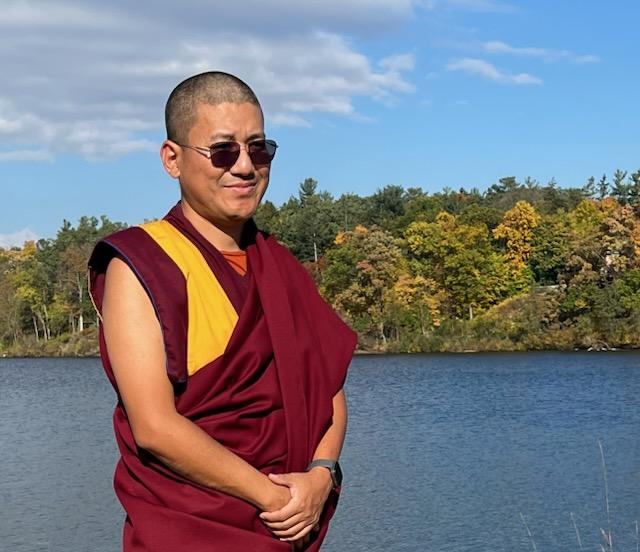As the Lama Chöpa says: When you are facing unwanted problems, especially when there is not much you can do about it, if you are able at that moment, try to see the problems as a karmic result. Recognize your bad karma is decreasing. When I talk about karma, people ask how we change karma. When enduring karmic results, you are eliminating that karma.
Instead of accumulating another bad karma by being upset with others, do purification to change the karma. Karma that you do or don’t remember causing. Anything done intentionally or unintentionally. Being able to feel sorry for those things becomes your purification.
Then, transform bad situations into good. How? Be wise, instead of stubborn. Use your wisdom on how to solve the problem, or to transform the problem. Some problems you can solve and maybe return the situation to what it was before. Some you cannot change back, but you can transform them. You can make it something manageable, that you can deal with. This all happens through patience, and knowing who we are. That’s why we talk about introspection. Look at your own mind and your own actions by yourself.
Sometimes you have a very patient friend who you are saying all sorts of bad things about. If your friend says nothing and seems okay, you feel it’s okay, but it’s not. Therefore, reflect on yourself, and ask, “How would I feel if they did the same to me?” Then you can realize your mistake. If someone is nice to you, without any introspection, that can just spoil you into easily losing your patience, unable to take anything.
If you are not able to hear corrections from others, it means you are not doing well. When someone says, “That’s wrong”, you should be able to think about whether it is true or not. If it is true, see you were wrong and accept that.
One time, a protester against His Holiness was saying he is a demon. His Holiness heard that and said, “That’s true, because inside of me there is a demon called ego-grasping mind.” He was not upset. He thinks that way. It is the result of practice. If someone calls us an idiot, there are certain points where we are idiots. We are ignorant and don’t know how to handle our emotions. We are not awakened yet. That is nothing to get very upset about. We might say, “That’s not very nice”, but we don’t have to go crazy. The point is, if someone scolds you or hurts you from the outside, if you lose your temper and react with anger, that will destroy your virtue. You will not get any benefit from it.
For bodhisattvas, harmful people are a source of virtue. It’s not because of harmful people but because of their practice. If someone bugs them they have a great opportunity to practice patience. That is very helpful, if you use it in your practice. If your practice is good enough, they will not destroy your virtue but increase your virtue. That is in our life everywhere.
We need patience, always. Especially compassionate patience. Sometimes we think that doing nothing is patience, right? But it’s not like that. You should have patience with compassion. If someone is bugging you, we should think, “This person cannot handle their negative emotions. They are suffering and that’s why they are bugging me.” Then you should have patience. Sometimes they just don’t know anything. Then consider, “If I say something back, that will hurt them. I don’t want to hurt them. Therefore, I will practice patience.” This is not “idiot patience”. It is patience with care, patience with wisdom.
If you are compassionate to all beings, you should be patient toward all beings. If on the one hand you say, “I am compassionate to all beings”, but you say, “I am upset with him or her and this and that” – including ourselves; or if you look at people and say, “I don’t like that person”, “I don’t like the way she talks” and find things to not like about people and then hate them, then that means you are hurting your compassion towards all beings.
Instead, if you have patience, when something happens and that incident becomes a means to develop your awakening mind, such as trying to see their problem, or their uneasiness, in that way you can increase your compassion and practice your patience. The more you follow that, the less you will get angry.
If you get angry immediately, it is a bad thing. If you take two minutes to get angry, that’s good. You can do a lot of things in these two minutes. So, any bad thing or irritating thing happening in our life, we should practice patience and understand that sometimes it could be our karmic result. Then, instead of blaming people and getting upset with them, we can wisely take it in this simple way and try to find a solution.

When Struggling with Problems, You Need Patience – Part 2 (Demo Rinpoche – Ancient Wisdom. Modern Times. #242 May 18, 2025)

